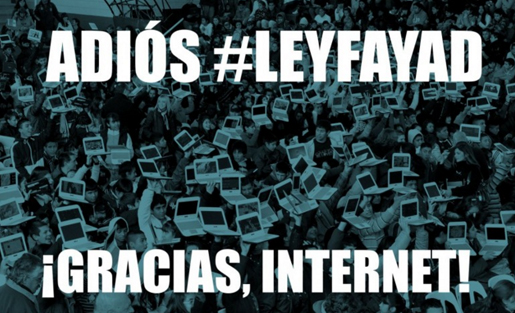Global Voices Advocacy’s Netizen Report offers an international snapshot of challenges, victories, and emerging trends in Internet rights around the world.
Mexico’s legislature considered — and then quickly shelved — a cybercrime bill that critics labeled “the worst Internet law in history.” The Law for the Prevention and Punishment of Information Crimes was drafted by Senator Omar Fayad of the notoriously power-hungry PRI party in collaboration with Mexico’s Federal Police. Known for short as the Fayad law, it covered most major areas that could be implemented in a law governing the Internet.
The #LeyFayad is Dead; Worst Bill in the History of the Internet Goes Up in Flames https://t.co/cjBQ6nBhF8 pic.twitter.com/rRYbJdvg2O
— Revolution News (@NewsRevo) November 4, 2015
The law contained broad language that conflated everyday computer activities with criminal acts. For example, the law made it illegal to “…willfully destroy, disable, damage or perform any act that alters the functioning of a computer system.” While this may have been intended to target individuals actively seeking to harm others’ computer systems, the act of “altering the function of a computer system” could be as simple as running a software update or changing one’s operating system. The law proposed five to 15 years’ jail time for this offense.
Another section of the law would have made violations of a a website or app’s terms of service punishable with up to one year in jail and a minimum fine of 800 to 1000 days’ salary. The incredibly broad scope of this section could have implicated anyone from an adult inciting violence or sharing pornography on YouTube to a 12-year-old lying about their age in order to use Facebook.
Most concerning were provisions that defined “computer terrorism” as the dissemination of information on the Internet “with the aim of destabilizing the public peace.” For journalists and human rights advocates, this had the looks of a policy that would criminalize the right to free expression online in Mexico. The law also criminalized various forms of public disclosure of data, measures that critics saw as a direct attempt to criminalize platforms like Mexicoleaks.
After thousands of citizens went online and into the streets to express opposition to the law, Senator Omar Fayad withdrew it from consideration.
More fatal attacks on writers in Bangladesh

A traffic jam in Dhaka, Bangladesh. Photo by Joisey Showaa on Flickr and reused here with Creative Commons license.
Two publishing houses in Dhaka, Bangladesh, were violently attacked by armed assailants, who murdered one publisher and left two others in serious condition. The brutal attacks are part of a string of assaults on powerful, secular intellectuals in the country. Both publishers had ties with Bangladeshi blogger and writer Avijit Roy, who was hacked to death in public in February 2015. Though the right to free expression is enshrined in Bangladesh’s constitution, the government has done little either to discourage the attacks or bring the perpetrators to justice.
Iranian student activist arrested
The student activist Amin Anvari has been arrested and held without charge in Iran for unclear reasons. According to family members, he has been pressured to make false confessions. Anvari received a suspended prison sentence in December 2014 for publishing a post on Facebook promoting basic civil liberties.
Facebook vows to maintain ‘real name’ policy, tinker with process

Photo by Maria Elena on Flickr and used here with Creative Commons license.
In response to a public letter sent to Facebook by Global Voices in partnership with the Electronic Frontier Foundation, the Association for Progressive Communications and the ACLU, the social media company has pledged to implement some modest changes to its “real name policy”, which requires users to register their profiles under “the name they’re known by in real life.” Facebook has no plans to do away with the policy, despite documentation from a wide range of users of the negative impact it has had on their lives. But the company has promised to make it easier for users to appeal their decisions on such matters, and to strengthen the process by which users can flag each other’s accounts for apparent violations of the policy. The company also announced that “going forward, IDs submitted to Facebook as part of this process will be encrypted when they are temporarily stored on our servers,” implying that these documents had been stored insecurely in the past.
EU parliament passes watered-down net neutrality bill
The European Parliament passed a new bill preventing Internet service providers from blocking Internet traffic, but with carve-outs allowing them to do so when required by law or necessary to manage congestion. The bill also contains rules that would enable companies to offer different levels of quality for ‘specialized services.’ One day after the bill was passed, Deutsche Telekom indicated it plans to ask startups to pay a share of their revenue for good Internet service, suggesting some telecommunications companies are already working to exploit loopholes.
IETF gives Tor a tip of the hat
The Internet Engineering Task Force formally recognized the use of the .onion top level domain name for hidden services websites accessed through Tor. The move recognizes .onion as a “special use domain name” used to “provide access to end to end, secure, anonymized services.” The Tor Project celebrated the announcement, saying “we think that this is a small and important landmark in the movement to build privacy into the structure of the Internet.”
New Research
- Ranking Digital Rights 2015 Corporate Accountability Index
- Beyond the Wall: Mapping Twitter in China – Berkman Center for Internet and Society
 The Netizen Report is produced by Global Voices Advocacy. Ellery Roberts Biddle, Marianne Diaz Hernandez, James Losey, Taisa Sganzerla and Sarah Myers West contributed to this report.
The Netizen Report is produced by Global Voices Advocacy. Ellery Roberts Biddle, Marianne Diaz Hernandez, James Losey, Taisa Sganzerla and Sarah Myers West contributed to this report.

